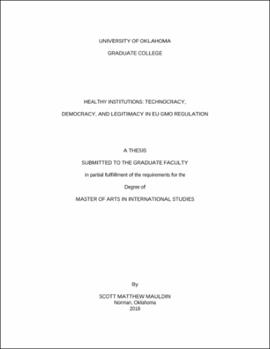| dc.contributor.advisor | Smith, Mitchell | |
| dc.contributor.author | Mauldin, Scott | |
| dc.date.accessioned | 2018-12-11T15:17:04Z | |
| dc.date.available | 2018-12-11T15:17:04Z | |
| dc.date.issued | 2018-12 | |
| dc.identifier.uri | https://hdl.handle.net/11244/316309 | |
| dc.description.abstract | As a result of several food and chemical-related public health scares as well as strong activism by environmental organization such as Greenpeace, longstanding majorities of European Union (EU) citizens support restrictions on the authorization and use of Genetically Modified Organisms (GMOs) for human and animal consumption in the EU. Given the EU’s ongoing Democratic Deficit and the deepening crisis of faith in recent years in European institutions, the European Commission under the leadership of Jean-Claude Juncker has been attempting to respond to these public desires with a series of proposed regulatory reforms.
However, Juncker’s policy proposals pose an enormous quandary for European Institutions for several reasons. Namely, they contravene rulings by both the European Court of Justice and the World Trade Organization and threaten the integrity of the European Single Market and the vitality of European economic competitiveness; further, when placed in the context of long-term regulatory changes in the EU, they threaten to reduce the role of scientific expertise in policymaking decisions, with implications for European technological and scientific leadership.
Several key questions arise from the current predicament regarding GMO Regulations in Europe, and which this thesis addresses. First, how did the history of European food and GM regulation lead to this current impasse and how does it frame the current debate? Second, what are the arguments in favor of the reforms proposed by the Juncker Commission? Third, what are the primary arguments against these reforms? This research will show that there is strong evidence both for and against the reforms. In light of this evidence, this thesis will provide tentative answers to a final question: what should European institutions do about the GMO question, and are there possible resolutions to this dilemma?
To answer the questions this work takes the following course: first, it details the regulatory history and committee rules that create the background of the GMO dilemma, and the proposed reforms that would resolve the dilemma. Second, it analyzes the nature of Europe’s democratic deficit and ongoing populist legitimacy crisis as informed by the political philosophies of Jürgen Habermas. Then, it explains the institutional and structural constraints such as European law and World Trade Organization rulings that pose an enormous quandary for the proponents of Juncker’s reforms and show that Schumpeter’s elaboration of the Public Choice Dilemma is at work, despite the impact of coalition behaviors.
Ultimately, this research argues that the broad strokes of the regulatory status quo should be preserved, but several specific points can be reformed in more democratic ways. This investigation draws implications for the intersection of public opinion, regulation, and science policy in the EU and throughout Western democracies, particularly regulation of new technologies, and finds that science and democracy should and do occupy separate spheres.
Keywords: European Union; GMOs; Technocracy; Health and Safety Regulation; Democracy; Limits of Democracy; Scientific Community; Precautionary Principle; Technology Assessment; Biotechnology; Politics of Science | en_US |
| dc.language | en_US | en_US |
| dc.subject | Political Science, International Law and Relations. | en_US |
| dc.subject | Science, Public Perceptions of | en_US |
| dc.subject | Sociology, Public and Social Welfare. | en_US |
| dc.subject | Economics, Commerce-Business. | en_US |
| dc.subject | Genetically Modified Foods, Politics of | en_US |
| dc.subject | European Union | en_US |
| dc.title | Healthy Institutions: Technocracy, Democracy, and Legitimacy in EU GMO Regulation | en_US |
| dc.contributor.committeeMember | Heinze, Eric | |
| dc.contributor.committeeMember | Morais de Sá e Silva, Michelle | |
| dc.date.manuscript | 2018-12-10 | |
| dc.thesis.degree | Master of Arts in International Studies | en_US |
| ou.group | David L. Boren College of International Studies | en_US |
| shareok.orcid | 0000-0002-4495-0134 | en_US |
